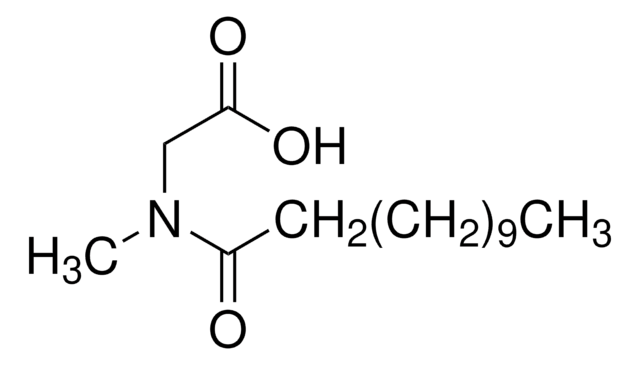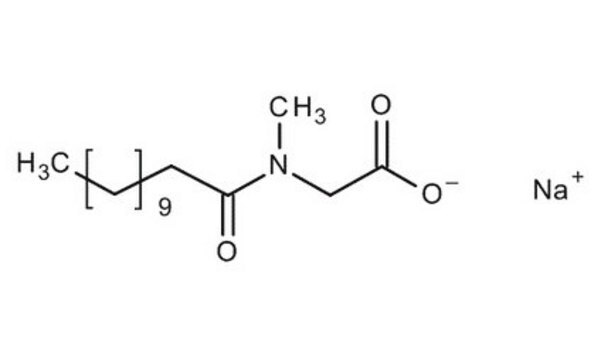L5125
N-Lauroylsarcosine sodium salt
≥94%
Synonym(s):
N-Dodecanoyl-N-methylglycine sodium salt, Sarkosyl NL
About This Item
Recommended Products
description
anionic
Assay
≥94%
form
powder
mol wt
micellar avg mol wt 600
average mol wt 600
aggregation number
2
technique(s)
oligo synthesis: suitable
CMC
14.6 mM (20-25°C)
solubility
H2O: 100 mg/mL, clear to slightly hazy, colorless to faintly yellow
SMILES string
[Na+].CCCCCCCCCCCC(=O)N(C)CC([O-])=O
InChI
1S/C15H29NO3.Na/c1-3-4-5-6-7-8-9-10-11-12-14(17)16(2)13-15(18)19;/h3-13H2,1-2H3,(H,18,19);/q;+1/p-1
InChI key
KSAVQLQVUXSOCR-UHFFFAOYSA-M
Looking for similar products? Visit Product Comparison Guide
Related Categories
Application
Biochem/physiol Actions
Other Notes
Signal Word
Danger
Hazard Statements
Precautionary Statements
Hazard Classifications
Acute Tox. 2 Inhalation - Eye Dam. 1 - Skin Irrit. 2
Storage Class Code
6.1B - Non-combustible acute toxic Cat. 1 and 2 / very toxic hazardous materials
WGK
WGK 1
Personal Protective Equipment
Regulatory Listings
Regulatory Listings are mainly provided for chemical products. Only limited information can be provided here for non-chemical products. No entry means none of the components are listed. It is the user’s obligation to ensure the safe and legal use of the product.
JAN Code
L5125-100G:
L5125-500G:
L5125-BULK:
L5125-VAR:
L5125-50G:
L5125-1KG:
Certificates of Analysis (COA)
Search for Certificates of Analysis (COA) by entering the products Lot/Batch Number. Lot and Batch Numbers can be found on a product’s label following the words ‘Lot’ or ‘Batch’.
Already Own This Product?
Find documentation for the products that you have recently purchased in the Document Library.
Customers Also Viewed
Our team of scientists has experience in all areas of research including Life Science, Material Science, Chemical Synthesis, Chromatography, Analytical and many others.
Contact Technical Service






